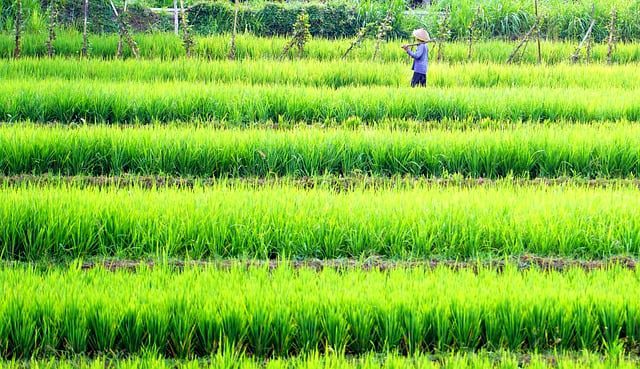“Empowering African Agriculture: Unlocking Transparency and Efficiency through Blockchain Technology.”
Blockchain technology has the potential to transform agriculture in Africa by enhancing transparency, improving supply chain efficiency, and increasing access to financial services for farmers. With its decentralized and immutable nature, blockchain can facilitate secure transactions, trace the origin of agricultural products, and ensure fair pricing. This innovation can empower smallholder farmers by providing them with better access to markets, reducing fraud, and enabling them to participate in global supply chains. By leveraging blockchain, the agricultural sector in Africa can achieve greater sustainability, productivity, and resilience, ultimately contributing to food security and economic development across the continent.
Supply Chain Transparency
The agricultural sector in Africa faces numerous challenges, including inefficiencies in supply chain management, lack of transparency, and issues related to trust among stakeholders. These challenges often lead to significant losses, affecting farmers, consumers, and the overall economy. However, the advent of blockchain technology presents a transformative opportunity to enhance supply chain transparency in agriculture across the continent. By leveraging the decentralized and immutable nature of blockchain, stakeholders can gain unprecedented visibility into the agricultural supply chain, thereby fostering trust and accountability.
To begin with, blockchain technology enables the creation of a secure and transparent ledger that records every transaction in the supply chain. This ledger is accessible to all authorized participants, including farmers, suppliers, distributors, and consumers. As a result, each step of the agricultural process—from planting and harvesting to processing and distribution—can be documented in real-time. This level of transparency not only allows stakeholders to track the origin of products but also ensures that they can verify the authenticity and quality of agricultural goods. For instance, consumers can scan a QR code on a product to access detailed information about its journey from farm to table, including the farming practices employed and the conditions under which it was produced.
Moreover, the implementation of blockchain can significantly reduce the prevalence of fraud and corruption within the agricultural supply chain. In many African countries, farmers often face exploitation by intermediaries who manipulate prices or misrepresent the quality of goods. By utilizing blockchain, transactions can be recorded in a tamper-proof manner, making it exceedingly difficult for any party to alter information without detection. This not only protects farmers from unfair practices but also empowers them to negotiate better prices for their produce, ultimately leading to improved livelihoods.
In addition to enhancing trust among stakeholders, blockchain technology can streamline processes and reduce inefficiencies in the supply chain. Traditional supply chains often involve multiple intermediaries, each adding layers of complexity and potential delays. By utilizing smart contracts—self-executing contracts with the terms of the agreement directly written into code—blockchain can automate various processes, such as payment settlements and order fulfillment. This automation not only speeds up transactions but also minimizes the risk of human error, ensuring that products reach consumers more efficiently.
Furthermore, the data collected through blockchain can provide valuable insights for decision-making. By analyzing trends and patterns in agricultural production and distribution, stakeholders can make informed choices that enhance productivity and sustainability. For example, farmers can access real-time data on market demand, enabling them to adjust their planting strategies accordingly. Similarly, policymakers can utilize aggregated data to identify areas that require intervention, such as infrastructure development or support for specific crops.
As the agricultural sector in Africa continues to evolve, the integration of blockchain technology offers a promising pathway toward greater supply chain transparency. By fostering trust among stakeholders, reducing fraud, streamlining processes, and providing actionable insights, blockchain has the potential to revolutionize the way agricultural products are produced, distributed, and consumed. Ultimately, this transformation could lead to a more resilient agricultural sector, capable of meeting the growing demands of a burgeoning population while ensuring the sustainability of resources for future generations. As stakeholders begin to embrace this innovative technology, the vision of a transparent and efficient agricultural supply chain in Africa is not just a possibility; it is an impending reality.
Smart Contracts for Farmers
In the evolving landscape of agriculture in Africa, the integration of blockchain technology presents a transformative opportunity, particularly through the implementation of smart contracts. These self-executing contracts, with the terms of the agreement directly written into code, can significantly streamline various processes within the agricultural sector. By automating transactions and ensuring transparency, smart contracts can enhance trust among stakeholders, thereby fostering a more efficient agricultural ecosystem.
To begin with, smart contracts can facilitate transactions between farmers and buyers, eliminating the need for intermediaries. Traditionally, farmers often face challenges in accessing markets due to a lack of direct connections with buyers. This disconnect can lead to unfavorable pricing and increased costs associated with intermediaries. However, with smart contracts, farmers can engage directly with consumers or retailers, allowing for real-time transactions that reflect fair market value. This direct engagement not only empowers farmers but also ensures that they receive a larger share of the profits from their produce.
Moreover, smart contracts can play a crucial role in ensuring timely payments. In many cases, farmers experience delays in receiving payments, which can hinder their ability to reinvest in their operations or meet immediate financial needs. By utilizing blockchain technology, smart contracts can automate payment processes, ensuring that funds are released immediately upon the fulfillment of agreed-upon conditions. For instance, once a shipment of produce is delivered and verified, the payment can be automatically triggered. This immediacy not only improves cash flow for farmers but also enhances their financial stability.
In addition to facilitating transactions, smart contracts can also enhance the traceability of agricultural products. In an era where consumers are increasingly concerned about the origins of their food, the ability to trace products back to their source is invaluable. Smart contracts can record every step of the supply chain on the blockchain, from planting and harvesting to processing and distribution. This level of transparency not only builds consumer trust but also allows farmers to differentiate their products in the market, potentially commanding higher prices for organic or sustainably sourced goods.
Furthermore, smart contracts can assist in managing agricultural inputs such as seeds, fertilizers, and pesticides. By automating the procurement process, farmers can ensure that they receive the right inputs at the right time, thereby optimizing their production processes. For example, a smart contract could be programmed to release funds for purchasing fertilizers only when certain conditions are met, such as soil testing results indicating a deficiency. This targeted approach not only reduces waste but also enhances productivity, ultimately contributing to food security in the region.
Additionally, the use of smart contracts can facilitate access to credit for farmers. In many African countries, smallholder farmers struggle to secure financing due to a lack of collateral and credit history. However, by leveraging blockchain technology, lenders can utilize smart contracts to assess risk more accurately and provide loans based on verified data regarding a farmer’s production history and market performance. This innovative approach can open up new avenues for financing, enabling farmers to invest in better equipment, technology, and practices.
In conclusion, the adoption of smart contracts within the agricultural sector in Africa holds immense potential to revolutionize the way farmers operate. By enhancing transparency, streamlining transactions, and improving access to resources, smart contracts can empower farmers, increase their profitability, and ultimately contribute to the overall growth and sustainability of the agricultural industry in the region. As the technology continues to evolve, it is imperative for stakeholders to embrace these innovations to unlock the full potential of agriculture in Africa.
Land Ownership and Title Security
In the context of agriculture in Africa, land ownership and title security represent critical issues that have far-reaching implications for economic development and food security. The traditional systems of land tenure in many African countries are often fraught with challenges, including unclear land rights, disputes over ownership, and a lack of formal documentation. These issues not only hinder agricultural productivity but also limit access to credit and investment, as farmers are unable to use their land as collateral. However, the advent of blockchain technology presents a transformative opportunity to address these challenges and enhance land ownership and title security across the continent.
Blockchain, a decentralized and immutable ledger technology, offers a novel solution to the complexities surrounding land ownership. By providing a transparent and tamper-proof record of land transactions, blockchain can help establish clear and verifiable land titles. This is particularly important in regions where informal land tenure systems prevail, as it allows for the digitization of land records, making them accessible to all stakeholders. As a result, farmers can prove their ownership rights more easily, reducing the likelihood of disputes and fostering a sense of security in their investments.
Moreover, the use of blockchain can streamline the process of land registration. Traditionally, land registration in many African countries is often mired in bureaucratic inefficiencies, leading to delays and increased costs. By leveraging blockchain technology, governments can create a more efficient and user-friendly system for land registration. This not only accelerates the process but also reduces the potential for corruption, as the decentralized nature of blockchain ensures that no single entity has control over the entire system. Consequently, farmers can obtain their land titles more quickly and with greater confidence, enabling them to focus on agricultural production rather than navigating a convoluted bureaucratic landscape.
In addition to improving land registration processes, blockchain can facilitate the creation of smart contracts that automate various aspects of land transactions. For instance, these contracts can be programmed to execute automatically when certain conditions are met, such as the payment of a specified amount for a land lease. This automation reduces the need for intermediaries, thereby lowering transaction costs and increasing the efficiency of land deals. Furthermore, smart contracts can enhance transparency, as all parties involved can access the same information in real time, minimizing the potential for misunderstandings or disputes.
The implications of enhanced land ownership and title security extend beyond individual farmers; they can also contribute to broader economic development. With secure land titles, farmers are more likely to invest in their land, adopting modern agricultural practices and technologies that can lead to increased productivity. This, in turn, can stimulate local economies, create jobs, and improve food security across the region. Additionally, secure land rights can attract foreign investment, as investors are more inclined to engage in agricultural ventures when they can be assured of clear ownership and title security.
In conclusion, the integration of blockchain technology into land ownership and title security systems in Africa holds immense potential to revolutionize agriculture on the continent. By providing a transparent, efficient, and secure framework for land transactions, blockchain can empower farmers, reduce disputes, and foster economic growth. As African nations continue to explore innovative solutions to their agricultural challenges, embracing blockchain technology may prove to be a pivotal step toward achieving sustainable development and food security for millions.
Access to Financing and Credit

Access to financing and credit remains a significant challenge for farmers in Africa, where traditional banking systems often overlook the agricultural sector due to perceived risks and a lack of collateral. This situation has led to a cycle of poverty and underinvestment, stifling the potential of millions of smallholder farmers who play a crucial role in the continent’s food security and economic development. However, the advent of blockchain technology presents a transformative opportunity to address these financial barriers, enabling farmers to access credit and financing in ways that were previously unimaginable.
One of the most compelling features of blockchain is its ability to create transparent and immutable records of transactions. This characteristic can be leveraged to establish a farmer’s creditworthiness, even in the absence of traditional credit histories. By utilizing blockchain, farmers can maintain a digital ledger of their agricultural activities, including crop yields, sales, and expenditures. This data can be shared with potential lenders, providing them with a clear and verifiable picture of the farmer’s financial behavior and agricultural productivity. Consequently, lenders can make more informed decisions, reducing the perceived risk associated with lending to smallholder farmers.
Moreover, blockchain can facilitate the creation of decentralized finance (DeFi) platforms tailored specifically for the agricultural sector. These platforms can connect farmers directly with investors, eliminating the need for intermediaries and reducing transaction costs. By using smart contracts, which are self-executing contracts with the terms of the agreement directly written into code, farmers can secure loans based on predetermined conditions. For instance, a farmer could receive funding for seeds and fertilizers, with repayment automatically triggered upon the sale of the harvested crops. This innovative approach not only streamlines the lending process but also enhances trust between parties, as the terms are transparent and enforceable without the need for traditional legal frameworks.
In addition to improving access to credit, blockchain technology can also enhance the efficiency of agricultural supply chains. By providing real-time tracking of products from farm to market, blockchain can help ensure that farmers receive fair prices for their goods. This transparency can attract more investors and lenders who are interested in supporting sustainable agricultural practices. When investors can see the entire supply chain and understand the impact of their funding, they are more likely to engage with farmers, knowing their investments contribute to a more equitable and sustainable agricultural ecosystem.
Furthermore, blockchain can facilitate the development of agricultural cooperatives, allowing farmers to pool resources and share risks. By creating a collective identity on the blockchain, these cooperatives can access larger amounts of financing and negotiate better terms with lenders. This collaborative approach not only empowers individual farmers but also strengthens community ties and fosters a sense of shared purpose.
As the agricultural landscape in Africa continues to evolve, the integration of blockchain technology offers a promising pathway to overcoming the financial barriers that have long hindered growth. By enhancing access to financing and credit, blockchain can empower farmers, stimulate investment, and ultimately contribute to the continent’s economic resilience. As stakeholders in the agricultural sector begin to recognize the potential of this technology, it is essential to foster an environment that encourages innovation and collaboration. In doing so, Africa can harness the full potential of its agricultural resources, paving the way for a more prosperous and sustainable future.
Crop Traceability and Quality Assurance
In recent years, the agricultural sector in Africa has faced numerous challenges, including issues related to crop traceability and quality assurance. These challenges not only affect the livelihoods of farmers but also hinder the continent’s ability to compete in global markets. However, the advent of blockchain technology presents a transformative opportunity to address these issues effectively. By leveraging the unique characteristics of blockchain, stakeholders in the agricultural supply chain can enhance transparency, improve traceability, and ensure the quality of agricultural products.
To begin with, one of the most significant advantages of blockchain technology is its ability to provide an immutable record of transactions. This feature is particularly beneficial for crop traceability, as it allows every participant in the supply chain—from farmers to consumers—to access a reliable history of a product’s journey. For instance, when a farmer harvests a crop, they can record essential information such as the date of harvest, the type of crop, and the methods used in cultivation on a blockchain platform. This data is then securely stored and can be accessed by subsequent stakeholders, including processors, distributors, and retailers. As a result, consumers can trace the origin of their food, gaining insights into its production practices and ensuring that it meets their quality standards.
Moreover, the transparency offered by blockchain can significantly enhance quality assurance processes. In traditional agricultural supply chains, the lack of visibility often leads to discrepancies in product quality, which can result in financial losses for farmers and a decline in consumer trust. However, with blockchain, each step of the supply chain can be monitored in real-time. For example, if a batch of produce is found to be contaminated or subpar, stakeholders can quickly trace it back to its source, allowing for swift action to be taken. This capability not only protects consumers but also helps maintain the integrity of the agricultural sector as a whole.
In addition to improving traceability and quality assurance, blockchain technology can also facilitate better communication among stakeholders. By creating a decentralized platform where information can be shared seamlessly, farmers can collaborate more effectively with suppliers, distributors, and retailers. This collaboration can lead to improved decision-making, as stakeholders can access real-time data on market trends, consumer preferences, and potential risks. Consequently, farmers can adjust their production strategies accordingly, ensuring that they meet market demands while maintaining high-quality standards.
Furthermore, the implementation of blockchain in agriculture can empower smallholder farmers, who often struggle to access markets due to a lack of information and resources. By providing them with a platform to showcase their products and share their stories, blockchain can help these farmers gain recognition and build trust with consumers. This empowerment not only enhances their economic prospects but also encourages sustainable farming practices, as consumers increasingly seek out ethically produced goods.
In conclusion, the integration of blockchain technology into the agricultural sector in Africa holds immense potential for revolutionizing crop traceability and quality assurance. By fostering transparency, enhancing communication, and empowering smallholder farmers, blockchain can create a more resilient and trustworthy agricultural supply chain. As stakeholders begin to recognize the benefits of this innovative technology, it is likely that we will see a significant shift in how agricultural products are tracked and verified, ultimately leading to improved outcomes for farmers and consumers alike. The future of agriculture in Africa may very well depend on the successful adoption of blockchain solutions, paving the way for a more sustainable and prosperous agricultural landscape.
Reducing Corruption in Agricultural Transactions
Corruption in agricultural transactions has long plagued the sector in Africa, undermining the potential for growth and development. The prevalence of fraudulent practices, such as bribery, misrepresentation, and embezzlement, not only diminishes the trust between stakeholders but also hampers investment and innovation. However, the advent of blockchain technology presents a transformative opportunity to address these challenges and foster a more transparent and accountable agricultural ecosystem.
At its core, blockchain is a decentralized digital ledger that records transactions across multiple computers in a way that ensures the data cannot be altered retroactively. This inherent characteristic of immutability makes blockchain an ideal solution for reducing corruption in agricultural transactions. By providing a transparent and tamper-proof record of all transactions, blockchain can significantly enhance the traceability of agricultural products from farm to market. For instance, farmers can register their produce on a blockchain platform, allowing buyers to verify the authenticity and quality of the goods before purchase. This transparency not only builds trust among stakeholders but also discourages corrupt practices, as any attempt to manipulate the data would be easily detectable.
Moreover, blockchain can streamline the supply chain by facilitating direct transactions between farmers and consumers or retailers. Traditionally, agricultural transactions often involve multiple intermediaries, each of whom may engage in corrupt practices that inflate prices or misrepresent product quality. By eliminating these intermediaries, blockchain enables farmers to receive fair compensation for their products while ensuring that consumers have access to high-quality goods. This direct connection not only reduces opportunities for corruption but also empowers farmers, giving them greater control over their livelihoods.
In addition to enhancing transparency and reducing intermediaries, blockchain can also improve access to financing for farmers. In many African countries, smallholder farmers often struggle to secure loans due to a lack of collateral and credit history. However, blockchain technology can provide a solution by creating a verifiable record of a farmer’s production history and financial transactions. Financial institutions can leverage this data to assess creditworthiness more accurately, thereby reducing the risk of corruption associated with loan approvals. By facilitating access to financing, blockchain can help farmers invest in better equipment, seeds, and practices, ultimately leading to increased productivity and income.
Furthermore, the use of smart contracts—self-executing contracts with the terms of the agreement directly written into code—can further mitigate corruption in agricultural transactions. Smart contracts can automate payment processes, ensuring that funds are released only when specific conditions are met, such as the delivery of goods or the completion of services. This automation reduces the potential for disputes and fraudulent claims, as all parties are bound by the terms encoded in the blockchain. Consequently, the reliance on trust is diminished, and the likelihood of corrupt practices is significantly reduced.
In conclusion, the integration of blockchain technology into the agricultural sector in Africa holds immense potential for reducing corruption in agricultural transactions. By enhancing transparency, streamlining supply chains, improving access to financing, and utilizing smart contracts, blockchain can create a more equitable and trustworthy environment for all stakeholders involved. As the continent continues to grapple with the challenges of corruption, embracing innovative solutions like blockchain may be key to unlocking the full potential of its agricultural sector, ultimately contributing to economic growth and food security.
Enhancing Market Access for Smallholder Farmers
In recent years, the agricultural landscape in Africa has faced numerous challenges, particularly for smallholder farmers who constitute a significant portion of the continent’s agricultural workforce. These farmers often struggle with limited access to markets, which hinders their ability to sell their produce at fair prices. However, the advent of blockchain technology presents a transformative opportunity to enhance market access for these farmers, thereby improving their livelihoods and contributing to food security across the region.
Blockchain technology, characterized by its decentralized and transparent nature, can facilitate direct connections between smallholder farmers and consumers or larger markets. Traditionally, smallholder farmers have relied on intermediaries to sell their products, which often results in reduced profit margins due to the additional costs imposed by these middlemen. By utilizing blockchain, farmers can create a digital identity for their products, allowing them to showcase their offerings directly to potential buyers. This direct access not only empowers farmers but also fosters a more equitable trading environment.
Moreover, blockchain can enhance trust in the agricultural supply chain. Consumers are increasingly concerned about the origins of their food and the practices involved in its production. By leveraging blockchain, farmers can provide verifiable information about their farming practices, including details about organic certification, pesticide use, and sustainability efforts. This transparency can attract consumers who prioritize ethical sourcing, thereby increasing demand for products from smallholder farmers. As a result, farmers can command higher prices for their goods, which directly contributes to their economic stability.
In addition to improving market access, blockchain technology can streamline payment processes for smallholder farmers. Traditional payment systems often involve delays and high transaction fees, which can be particularly burdensome for farmers who rely on timely payments to sustain their operations. Blockchain enables the use of cryptocurrencies or smart contracts, which can facilitate instant payments upon delivery of goods. This efficiency not only reduces transaction costs but also mitigates the risks associated with payment delays, allowing farmers to reinvest in their businesses more effectively.
Furthermore, blockchain can play a crucial role in aggregating data that can inform agricultural practices and market trends. By collecting and analyzing data on crop yields, market prices, and consumer preferences, farmers can make more informed decisions about what to plant and when to sell. This data-driven approach can lead to increased productivity and profitability, as farmers align their production with market demand. Additionally, access to real-time information can help farmers anticipate market fluctuations, enabling them to strategize their sales more effectively.
As the potential of blockchain technology continues to unfold, it is essential for stakeholders, including governments, NGOs, and private sector actors, to collaborate in creating an enabling environment for its adoption in agriculture. This includes investing in digital infrastructure, providing training for farmers on how to use blockchain tools, and fostering partnerships that connect farmers with technology providers. By working together, these stakeholders can ensure that smallholder farmers are not left behind in the digital revolution.
In conclusion, blockchain technology holds significant promise for enhancing market access for smallholder farmers in Africa. By facilitating direct connections to consumers, increasing transparency, streamlining payment processes, and providing valuable data insights, blockchain can empower farmers to improve their economic circumstances and contribute to the overall growth of the agricultural sector. As the continent continues to grapple with food security challenges, embracing innovative solutions like blockchain will be crucial in building a more resilient and equitable agricultural system.
Q&A
1. Question: How can blockchain improve supply chain transparency in African agriculture?
Answer: Blockchain can provide a tamper-proof ledger that tracks the journey of agricultural products from farm to market, ensuring transparency and traceability for consumers and stakeholders.
2. Question: In what ways can blockchain enhance access to financing for farmers in Africa?
Answer: Blockchain can facilitate smart contracts and decentralized finance (DeFi) solutions, allowing farmers to access microloans and funding directly from investors without traditional banking barriers.
3. Question: How does blockchain help in reducing post-harvest losses in agriculture?
Answer: By enabling real-time tracking and data sharing, blockchain can optimize logistics and inventory management, reducing spoilage and waste during transportation and storage.
4. Question: What role does blockchain play in ensuring fair trade practices in African agriculture?
Answer: Blockchain can verify and document fair trade practices, ensuring that farmers receive fair compensation and that consumers can trust the ethical sourcing of their products.
5. Question: How can blockchain technology assist in land registration and ownership verification?
Answer: Blockchain can create a secure and immutable record of land ownership, reducing disputes and fraud while providing farmers with proof of ownership that can facilitate access to credit.
6. Question: In what way can blockchain support agricultural research and development in Africa?
Answer: Blockchain can enable the secure sharing of agricultural data and research findings among stakeholders, fostering collaboration and innovation in crop development and farming practices.
7. Question: How can blockchain contribute to improving food safety in African agriculture?
Answer: By providing a transparent and traceable record of food production and processing, blockchain can help identify sources of contamination quickly, enhancing food safety and consumer confidence.Blockchain technology has the potential to revolutionize agriculture in Africa by enhancing transparency, improving supply chain efficiency, and increasing access to financial services for farmers. By providing a decentralized and immutable ledger, blockchain can facilitate traceability of agricultural products, ensuring quality and safety for consumers. It can also streamline transactions between farmers, suppliers, and buyers, reducing costs and eliminating intermediaries. Furthermore, blockchain can enable farmers to access credit and insurance through smart contracts, empowering them to invest in their operations and mitigate risks. Overall, the adoption of blockchain in agriculture can lead to increased productivity, better market access, and improved livelihoods for farmers across the continent.




